
With sales dropping and the company unable to find a buyer, Jacksonville-based Stein Mart Inc. in January 2019 launched an initiative called “POPS” - Path to Off-Price Success - to turn the business around.
Stein Mart had 281 stores in 30 states as a national specialty off-price retailer offering designer and name-brand fashion apparel, home décor, accessories and shoes at discount prices.
Early tests of POPS showed promise but before it could gain traction, the initiative was put on hold when the fashion retailer did find a buyer in January 2020, Kingswood Capital Management LLC.
However, after the COVID-19 pandemic forced Stein Mart to close its stores in March, it had to terminate the merger agreement in April.
When the stores did reopen, a resurgence of COVID-19 made it impossible to generate enough sales to keep the business viable.
That left Stein Mart no alternative but to file a petition last week for Chapter 11 bankruptcy, according to a case management summary filed in U.S. Bankruptcy Court for the Middle District of Florida Jacksonville Division.
Stein Mart CEO Hunt Hawkins said in an emailed statement that the board of directors looked at all alternatives before deciding that winding down the business is the best course of action.
“Please know that this was an extremely difficult decision, and is deeply disappointing for all of us at Stein Mart,” he said.
The case management filing outlines how Stein Mart ended up in bankruptcy and began going-out-of-business sales at its 281 stores in 30 states.
The company could be saved if a last-minute buyer emerges, but the filing acknowledges “the sale of the Company as a going concern is not a realistic possibility under present conditions.”
Blame for downfall
Stein Mart said in the filing its downfall was caused by the same conditions affecting other brick-and-mortar retailers: declines in customers as shoppers buy more merchandise online.
“The declines in store traffic have been especially pertinent for apparel and accessories retailers, such as the Company, which have also experienced lower operating margins as a result,” it said.
“From 2016 through the present, the Company’s sales generally declined and the Company faced the difficult task of growing sales while significantly reducing expenses in a difficult retail environment.”
With the company struggling, Stein Mart in January 2018 publicly put itself up for sale, retaining investment banker PJ Solomon Securities to find a possible buyer or another source of financing.
A year later, PJS informed Stein Mart’s board of directors that it was unsuccessful.
“PJS reported that private equity firms were generally no longer investing in the retail sector and that with respect to strategic investors, the situation was dependent on the retailer having a compelling strategic rationale and sufficient financial flexibility,” the court filing said.
“The consensus of the board and advisors was that renewing the sale process at that time would not be worth the effort.”
At the same time it stopped the search for buyers, Stein Mart launched the POPS initiative.
“The initiative included substantial changes in store design and layout, advertising strategy and pricing and discounting practices,” the filing said.
“The Company tested the new business model in the Richmond and Detroit stores. Based on the preliminary success of the test, the Company planned to roll-out the new model to one-third of the Company stores in early 2020.”
In the meantime, PJS in the spring of 2019 again began contacting potential buyers, and that led to the agreement with Kingswood in January 2020. The plan to roll out POPS was put on hold.
The pandemic impact
COVID-19 changed everything.
“On April 16, 2020, the Merger Agreement was terminated prior to closing because the COVID-19 pandemic forced the Company to close all of its stores and the Company was unable to satisfy the minimum liquidity closing condition in the merger agreement,” the filing said.
Stein Mart began reopening its stores a week later and when all 281 were reopened in June, the company was seeing some optimistic sales trends.
“However, during July 2020, the resurgence of COVID-19 cases in the Southeast, Texas, Arizona and California, where the majority of the Company’s stores are located, again materially, adversely impacted the Company’s revenues, liquidity, results of operations and cash flows,” the filing said.
“As a result of the second decline in customer traffic and sales resulting from the COVID-19 resurgence, the Company projects insufficient liquidity to continue operating as (a) going concern in the ordinary course of business.”
The filing said Stein Mart has had discussions with Kingswood about reviving the sale. “However, a transaction presently appears unlikely given the COVID-19 resurgence.”
PJS contacted other parties since the merger agreement was terminated in April.
“If Kingswood or another potential buyer steps forward with an offer to buy all or part of the Company as a going concern, the Debtors will pursue a sale to maximize value and preserve the jobs of employees, as well as a potential future tenant for landlords and a potential future customer for vendors,” the filing said.
That outcome is unlikely, so Stein Mart is moving forward with plans to wind down the business.
“The Company believes the immediate liquidation of the Company’s assets by a professional liquidation advisor under the supervision of the Bankruptcy Court is the best strategy to maximize value for the benefit of creditors.”